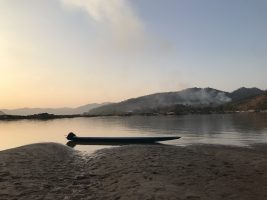Stockholm University, Stockholm, Sweden
Keywords: Thailand, hydropower, development, political ecology, Mekong, monarchy
DOI: 10.5509/2024972-art2
The Xayaburi Hydroelectric Power Project entered operation in October 2019. After this the Mekong started to behave strangely—the water ran blue and clear instead of red and silty, and the great backflow of the river into Cambodia’s Tonle Sap Lake arrived off schedule or, at times, threatened to not arrive at all. Villagers who had remained ambivalent or apathetic about hydropower issues suddenly found themselves facing a radically altered world, where a seemingly distant power was able to dramatically alter the nature of their every day. These shifts introduced an arrhythmia into the hydroscape: ecological, fishing, and religious cycles adapted to a seasonal river were off sync with power demands.
The radical alteration that dams make to the landscape, in the promise of irrigation, electrification, and the sheer feat of changing a river, are a tangible symbol of the state’s power over its land. But with a deep look into hydropower projects—in this case, the dams across the midstream of the Mekong in Laos and China—the story grows more convoluted. Here are conflicting narratives of power: state-focused, international, and royalist; as well as religious, ecological, and hydrosocial. Here, too, as I found in my eight years of fieldwork in Lao-speaking Thailand, is an alteration in time, where the rhythms of the river change the rhythms of life, and where the cyclical riparian clock clashes with a future-oriented developmentalist notion of time.
隐流:水力发电和湄公河开发的节奏
关键词:泰国、水力发电、发展、政治生态学、湄公河、君主制
沙耶武里水力发电项目于2019年10月投入运营。此后的湄公河开始表现得异常: 河水不再呈红色和夹杂淤泥,而是变得碧蓝清澈,而且注入柬埔寨洞里萨湖的大回流也未如期到达—— 或是不时威胁着根本不会抵达。此前对水力发电问题抱持矛盾或者冷漠态度的村民突然发现自己面对一个被彻底改变的世界,其中一个看似遥远的权力能够极大地改变他们日常生活的性质。这些变化给水景带来了一种心律失常:与一条季节性河流相适应的生态、渔业和宗教循环与对电力的需求并不同步。
大坝对景观的彻底改变——许诺带来灌溉、电气化、甚至单单改造一条河流的巨大壮举——都是一个国家对其土地具有的权力的有形象征。但是随着对水电项目的深入检视——本案例中是位于老挝和中国的湄公河中游的大坝——故事变得越来越错综复杂。以下是相互矛盾的权力叙事:国家中心的、国际的以及保皇派的;以及宗教的、生态的和水利社会的。正如我在泰国说老挝语地区八年的田野调查所发现的一样,这里也发生了时间的变动,河流的节奏改变生活的节奏,而且周期性的沿岸的时钟与一个面向未来的发展主义者的时间概念相冲突。
Translated by Li Guo
